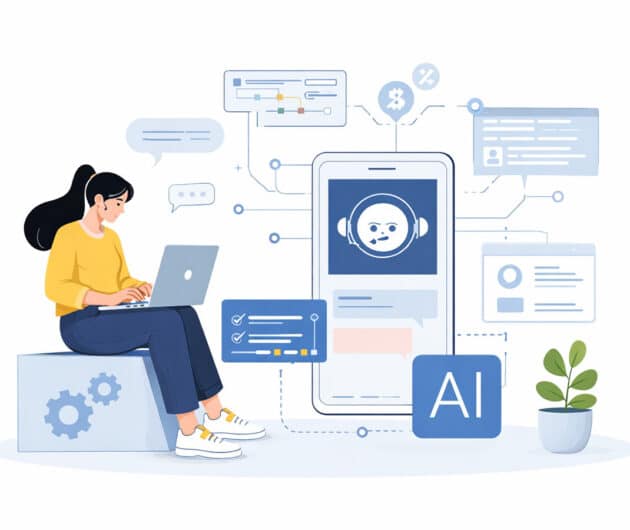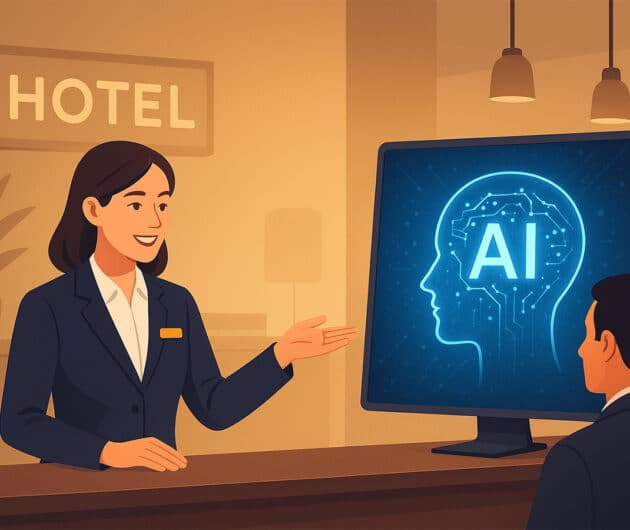Beyond Automation: How AI is Redefining Digital Transformation
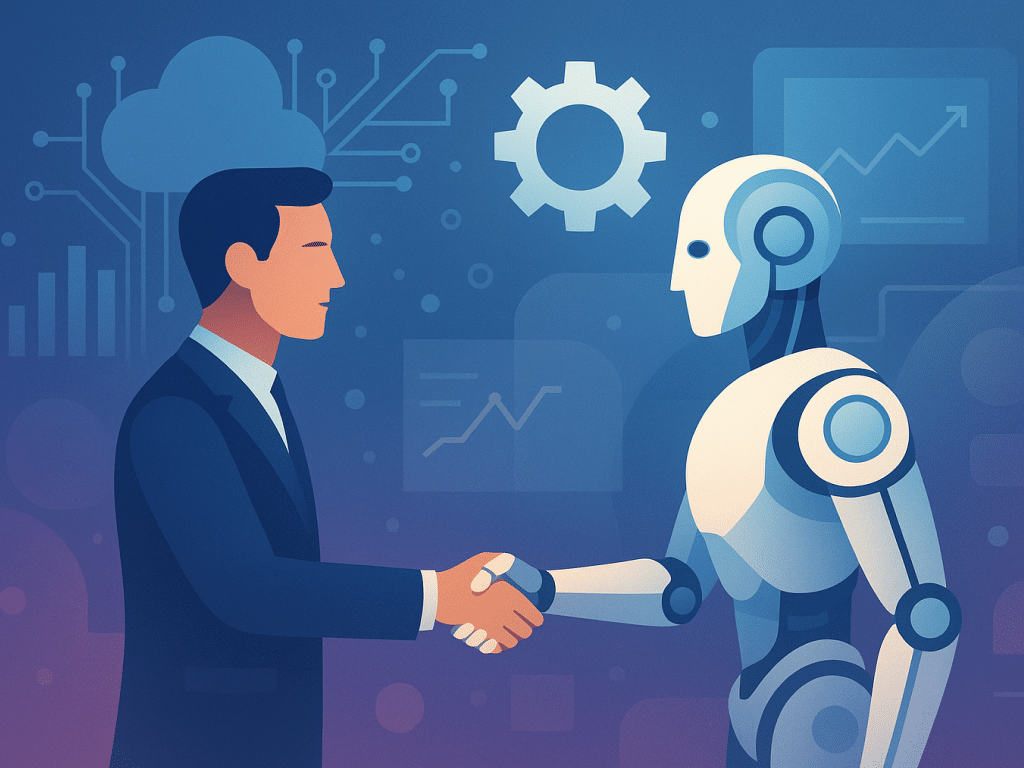
-
Ankit Patel
- September 08, 2025
- 6 min read
The business world is moving at a pace no one could have imagined a decade ago. Deals are closed in minutes, supply chains adapt in real-time, and customer expectations shift faster than quarterly reports. Amid this whirlwind, one force is not just keeping up—it’s rewriting the rules for how companies operate, innovate, and grow: Artificial Intelligence.
Forget everything you thought you knew about AI. It’s no longer a futuristic concept or a luxury reserved for tech giants. Today, it’s a strategic partner for enterprises worldwide. It anticipates customer needs before they are voiced, predicts operational challenges before they arise, and frees teams from repetitive work so they can focus on creativity, strategy, and innovation. From healthcare systems diagnosing diseases faster than ever to banks detecting fraud in milliseconds, AI is transforming business outcomes across every industry.
Global enterprises that leverage AI today are not just keeping up—they’re setting the pace for tomorrow’s markets.
Consider this: Businesses that have embraced AI report measurable growth and efficiency gains. McKinsey notes that 63% of companies using AI have seen revenue growth, while 44% achieved significant cost savings. These are not just numbers—they’re evidence that AI is no longer optional. It’s a critical driver of competitiveness, a tool that separates market leaders from those at risk of falling behind.
Enterprises are increasingly leveraging AI development services to design tailored solutions that automate operations, predict trends, and enhance customer engagement at a global scale.
For decision-makers, CEOs, CTOs, and business leaders, the question is no longer if AI will transform your organization—it’s how fast you can harness it to stay ahead. The AI-driven wave of digital transformation is not coming—it has already arrived.
◉ Understanding the Role of AI in Digital Transformation
Digital transformation with AI is not merely about implementing new technologies; it’s about rethinking business models and creating smarter, more agile organizations. AI and digital transformation work hand-in-hand. AI provides intelligence—an ability to learn from data, recognize patterns, and make predictions—while digital transformation provides the framework to apply this intelligence to business strategy.
Artificial intelligence in business is being used to automate repetitive processes, enhance decision-making, and improve customer experiences. Companies now leverage AI business applications to forecast trends, optimize supply chains, and personalize marketing campaigns. By combining human insight with AI-powered automation, organizations achieve a level of efficiency and agility previously unimaginable.
Working with a reliable AI development company allows businesses to implement robust, scalable solutions that align with long-term strategic goals, ensuring AI adoption delivers measurable impact.
◉ AI in Action Across Industries
The transformative power of AI can be seen across multiple industries. Here are some compelling examples:
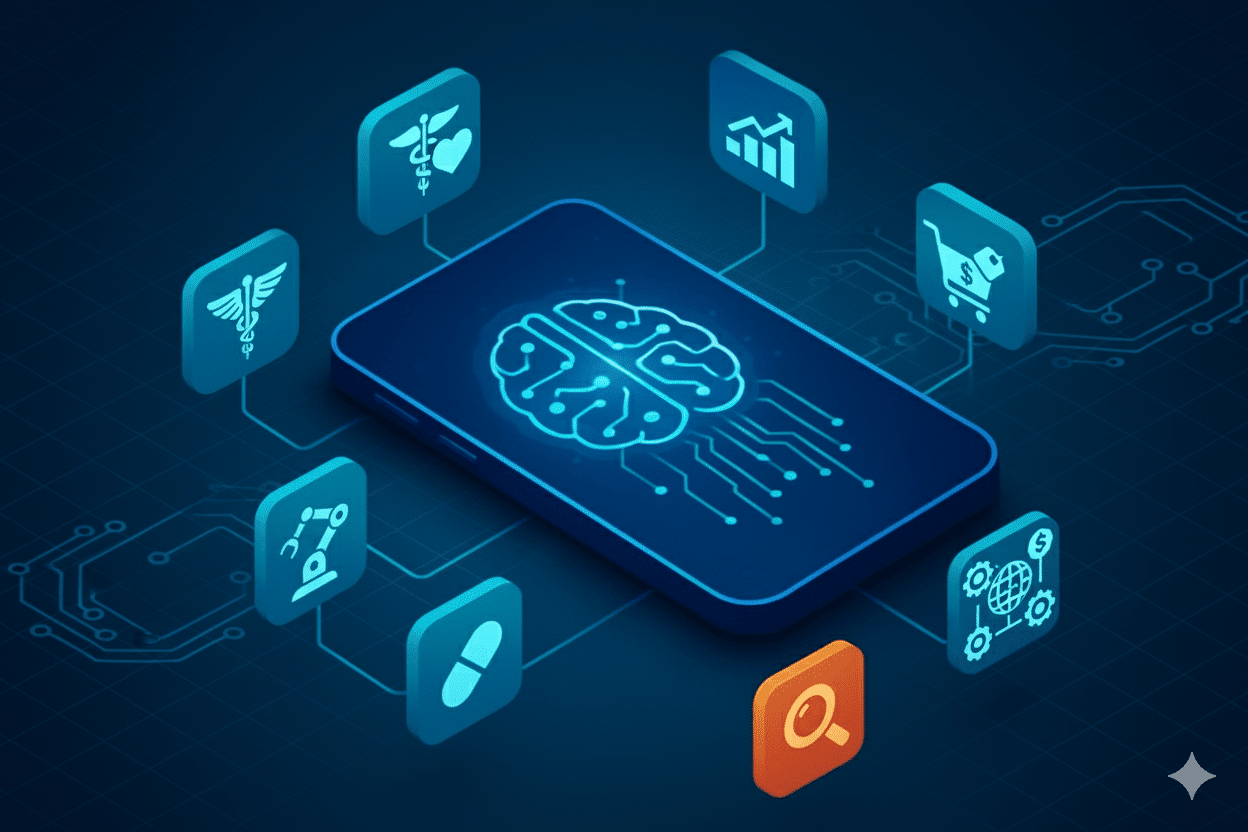
1. Healthcare: Precision and Efficiency
AI in healthcare is revolutionizing patient care. Machine learning algorithms analyze vast amounts of medical data to identify patterns and predict outcomes. Hospitals using AI for diagnostics report faster and more accurate results, improving patient outcomes. For instance, AI-assisted imaging can detect diseases like cancer earlier than traditional methods, giving patients a better chance at successful treatment. According to Accenture, AI in healthcare could save the industry $150 billion annually by 2026.
Beyond diagnostics, AI optimizes hospital operations. Scheduling systems powered by AI ensure that staff, equipment, and resources are allocated efficiently, reducing delays and improving patient satisfaction. In essence, AI allows healthcare providers to do more with less while delivering higher-quality care.
2. Finance: Smarter, Safer Banking
Financial institutions are leveraging AI for risk management, fraud detection, and personalized services. AI-driven algorithms analyze millions of transactions in real time, flagging anomalies before they become issues. Personalized AI advisors provide clients with tailored investment advice, improving satisfaction and engagement.
A global bank reported that integrating AI into its risk management systems reduced operational losses by 30% while speeding up decision-making processes. AI in finance is not just about efficiency—it’s about trust, safety, and better service for clients worldwide.
3. Retail: Personalization and Engagement
Retailers are turning to AI for customer experience management. AI analyzes customer behavior, purchase history, and online interactions to recommend products, optimize pricing, and predict demand. Companies implementing AI-powered personalization see significant increases in conversion rates and customer loyalty. Gartner predicts that by 2025, 80% of global retailers will use Generative AI to enhance customer engagement strategies.
AI also plays a crucial role in inventory management. Predictive analytics helps retailers stock the right products at the right time, reducing waste and maximizing profitability. In a competitive global marketplace, AI ensures that businesses remain agile and responsive to changing consumer behavior.
4. Manufacturing: Predictive Maintenance and Optimization
AI in manufacturing is transforming production processes. Predictive maintenance systems analyze sensor data from machines to forecast potential failures before they occur, reducing downtime and maintenance costs. AI also optimizes supply chains, scheduling, and production lines to increase efficiency and reduce waste.
Global manufacturing companies that adopt AI-powered digital transformation report higher operational efficiency, lower production costs, and improved product quality. AI doesn’t replace human workers—it empowers them, enabling teams to focus on complex, creative, and strategic tasks while AI handles repetitive operations.
5. Supply Chain Management: Agility and Resilience
The global supply chain is increasingly complex, and AI is helping businesses navigate it with precision. AI predicts disruptions, optimizes routes, and ensures inventory levels meet demand. During the COVID-19 pandemic, companies that integrated AI into supply chain management were better positioned to adapt, maintain operations, and meet customer needs compared to those relying on traditional systems.
AI-driven supply chains are faster, more efficient, and more resilient. By leveraging AI development services, businesses can deploy advanced logistics and inventory solutions, ensuring global scalability and operational agility.

◉ How AI Shapes Business Strategy
AI is not just about automation—it’s a strategic driver of innovation. Companies leveraging AI for business strategy gain the ability to anticipate trends, make data-driven decisions, and innovate faster. AI and business automation free teams from routine tasks, allowing them to focus on strategy, creativity, and customer engagement.
Generative AI for business is enabling rapid innovation. Teams can generate content, design prototypes, simulate market scenarios, and test strategies in ways that were previously impossible. AI doesn’t replace human intelligence; it augments it, providing tools to make smarter, faster, and more informed decisions.
Data-driven decision-making powered by AI allows leaders to anticipate market shifts, identify opportunities, and mitigate risks. AI is no longer a support function—it is central to the way modern businesses operate and grow.
◉ Key Technologies Driving Digital Transformation
Several AI technologies are powering this transformation:
- Machine Learning: Learns from historical data to make predictions and improve processes.
- Generative AI: Creates content, designs, and solutions autonomously.
- Natural Language Processing (NLP): Enables conversational AI, chatbots, and enhanced customer interactions.
- Predictive Analytics: Anticipates trends and outcomes, supporting proactive decision-making.
- Data Analytics & AI: Turns large datasets into actionable insights.
- Cloud Computing & AI: Makes AI scalable and accessible globally.
These technologies are not futuristic—they are operational today, driving business efficiency and innovation at scale.
◉ Benefits of AI for Businesses
AI is not just a technology—it’s a strategic accelerator. Companies adopting AI see tangible results that transform operations, decision-making, and customer engagement:
- Operational Efficiency: AI automates routine tasks and streamlines processes.
- Improved Customer Experiences: Personalized interactions increase satisfaction and loyalty.
- Faster, Smarter Decisions: Real-time insights improve strategic planning.
- Innovation Acceleration: AI supports creative processes and faster product development.
- Scalability: By leveraging AI development services, enterprises can deploy intelligent solutions worldwide with minimal friction.
You May Also Like: AI in Mobile App Development: A Definitive Guide
◉ Overcoming Challenges in AI Adoption
Implementing AI globally comes with its own complexities—but each challenge is an opportunity when addressed correctly:
- Data Quality and Compliance: AI relies on accurate, clean, and compliant data to function effectively.
- Skill Gaps: Employees need the right training to work alongside AI systems, transforming human-AI collaboration into a competitive advantage.
- Integration with Existing Systems: Properly integrated AI enhances workflows instead of disrupting them.
- Ethical AI Practices: Transparency, fairness, and security ensure that AI decisions are trusted and reliable.
Organizations that tackle these challenges proactively don’t just implement AI—they harness it to drive growth, efficiency, and innovation at a global scale.

◉ Looking Ahead: The Future of AI-Powered Digital Transformation
One thing is certain: AI will continue to shape business strategy, operations, and customer engagement. Companies that adopt it today won’t just keep up; they’ll define tomorrow’s global markets. Generative AI, predictive analytics, and NLP will drive innovation, efficiency, and agility across industries.
The businesses that succeed will be those that view AI as a partner, not a replacement—a tool to empower teams, streamline operations, and deliver exceptional customer experiences. Partnering with the right AI development company can accelerate this transformation, enabling enterprises to innovate faster and scale globally. The AI-driven era of business has arrived, transforming the way we work, innovate, and compete globally.
◉ Wrapping up
Artificial Intelligence is no longer an optional tool—it is the backbone of modern business transformation. From healthcare to finance, retail to manufacturing, AI helps businesses operate smarter, innovate faster, and connect more meaningfully with customers.
The organizations that embrace AI-powered digital transformation now will define the future of global business. AI is not just technology—it is a partner, amplifying human intelligence, creativity, and strategy. The question is no longer whether AI will shape the future—it’s whether your business is ready to harness it.
You may also like
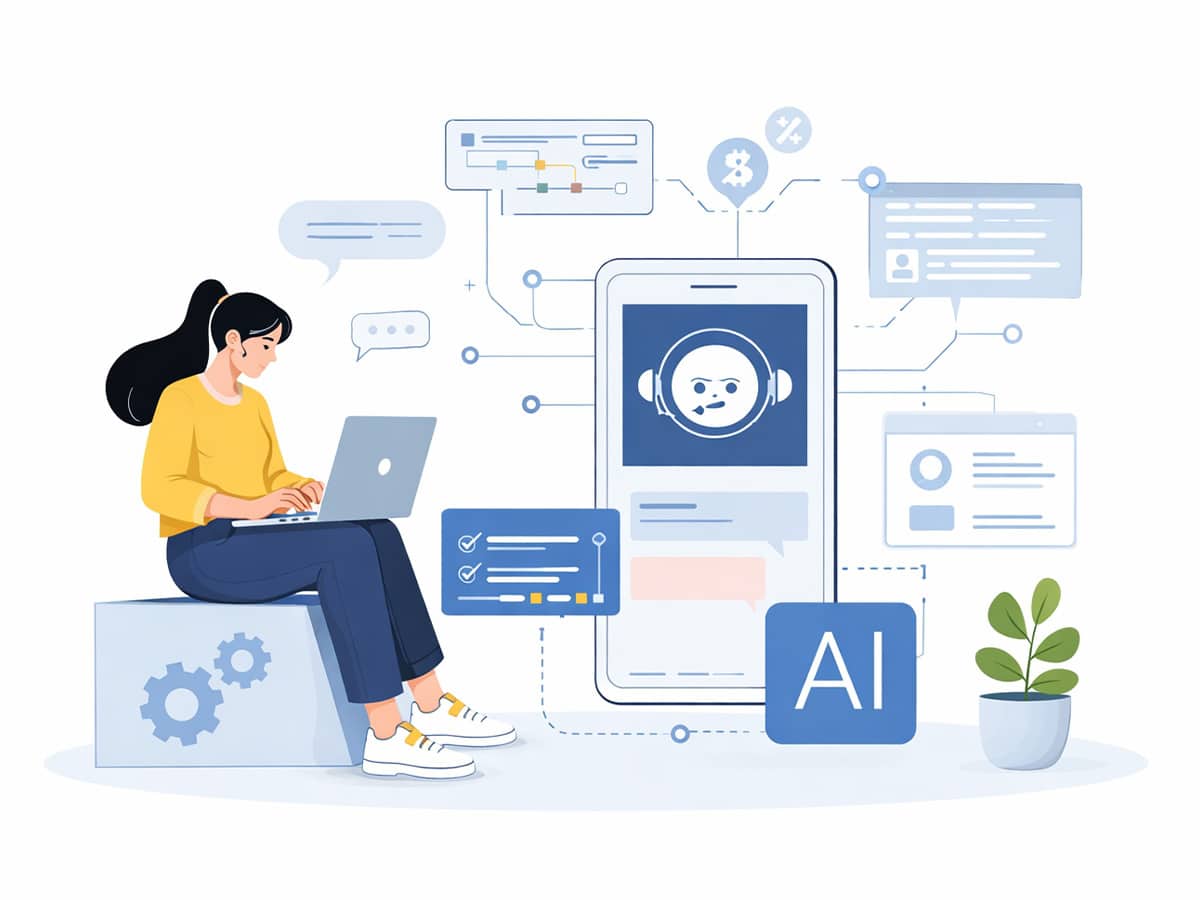
How Agentic AI Is Transforming SaaS Applications
-
Ankit Patel
Software-as-a-Service has always promised efficiency. But until recently, most SaaS products still depended heavily on human effort — clicking buttons, setting rules, monitoring dashboards, and reacting to problems after they… Read More

AI Chatbot Development Cost 2026: Enterprise Pricing Guide
-
Jignesh Nakrani
If there’s one technology that is reshaping how modern businesses operate, it is AI chatbots, and that is not an overstatement. Today, 78% of global enterprises use conversational AI in… Read More

Top 10 AI Agent Use Cases Driving Business Growth in 2026
-
Ankit Patel
Repetitive tasks, endless approvals, and drowning in data are common challenges for businesses today. But imagine if all of that could disappear. Welcome to the world of AI agents for… Read More

